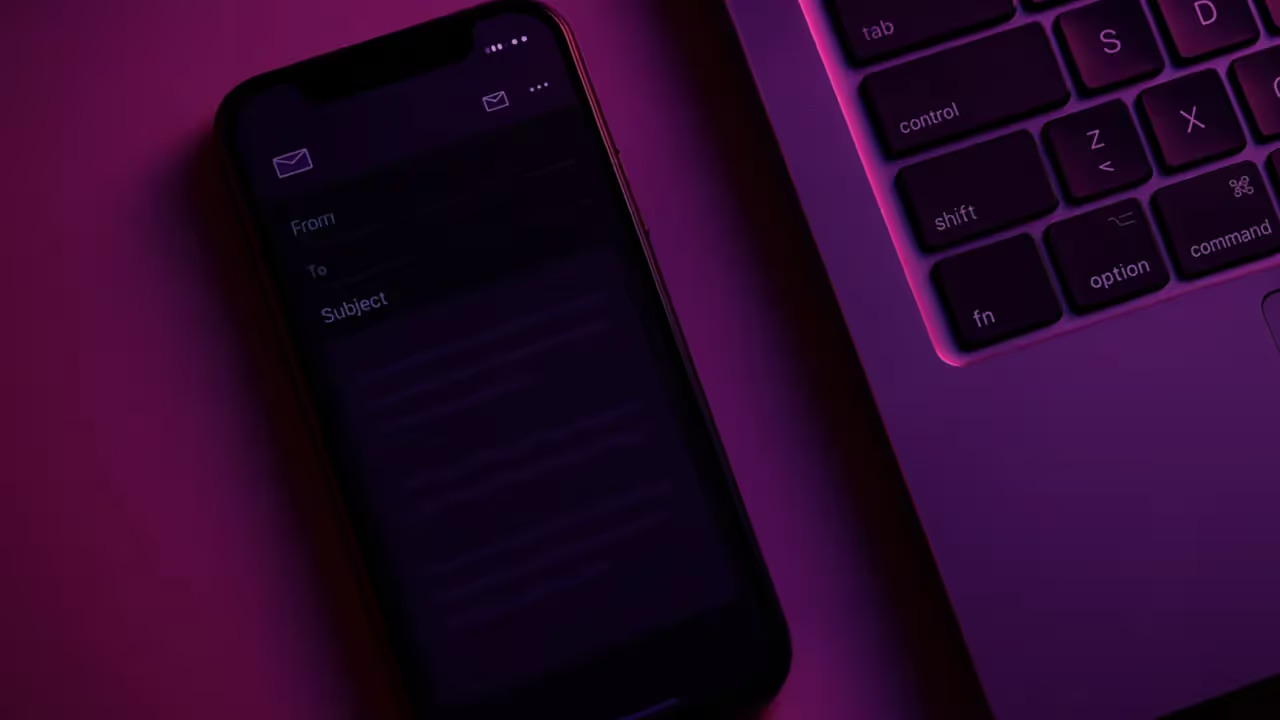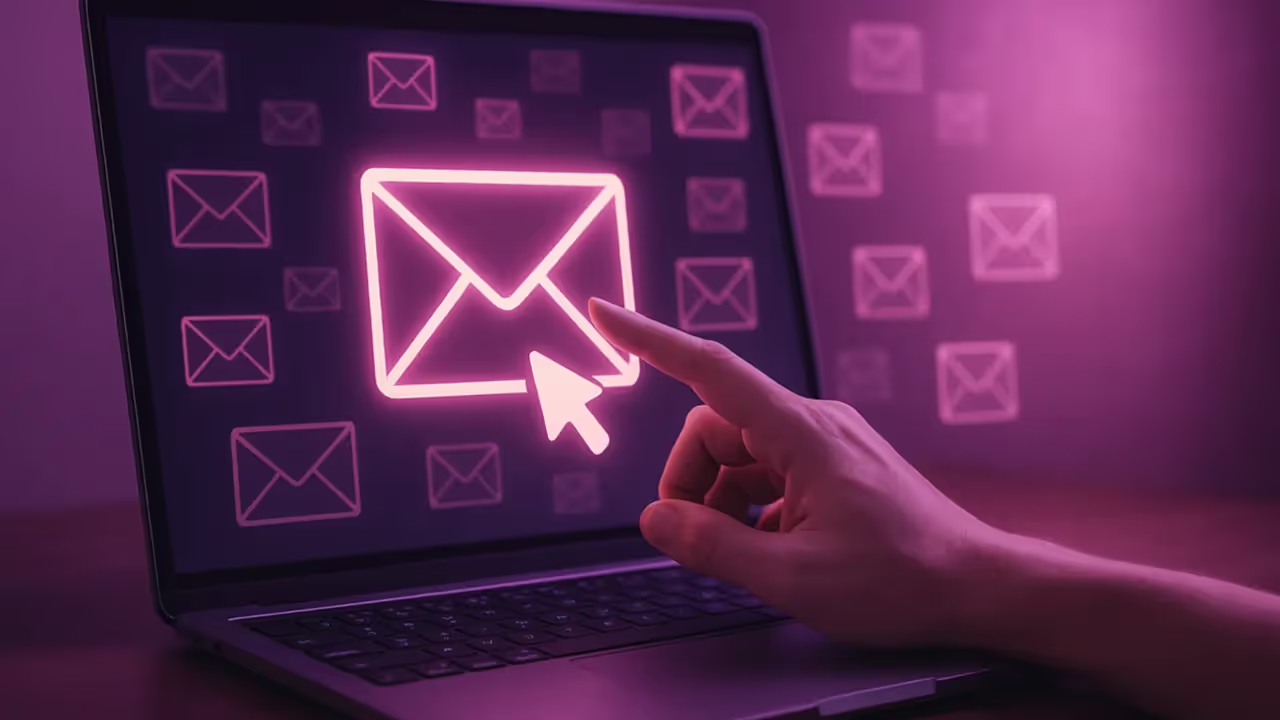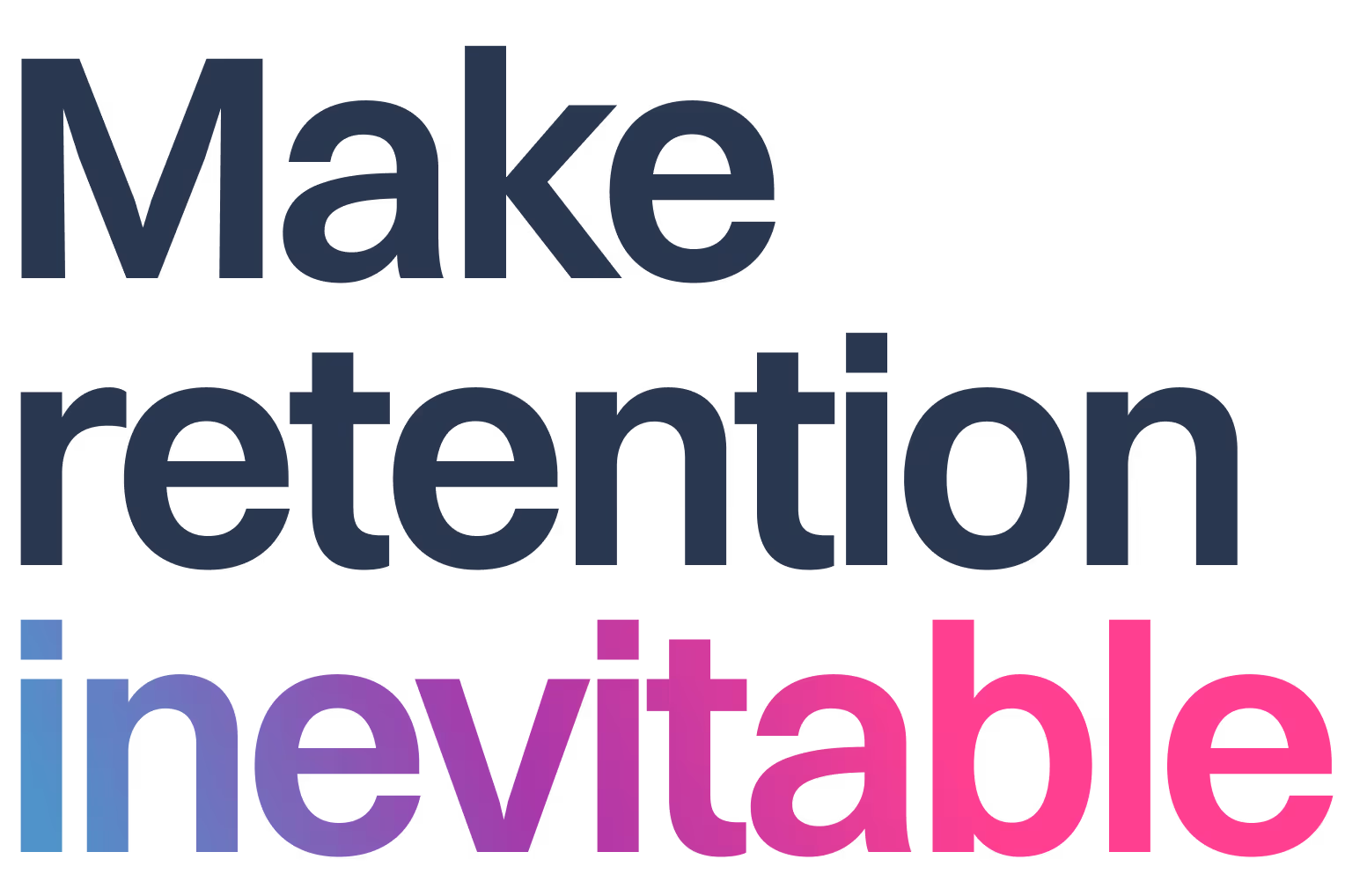What is WhatsApp Marketing? A Complete Guide
WhatsApp marketing is businesses using WhatsApp to connect directly with customers through personalized messages, multimedia content, and interactive tools like chatbots. This approach turns the world's most popular messaging app into a powerful marketing channel that delivers exceptional results.
With over 2 billion active users globally, WhatsApp offers brands unprecedented reach combined with intimacy that traditional marketing channels can't match.
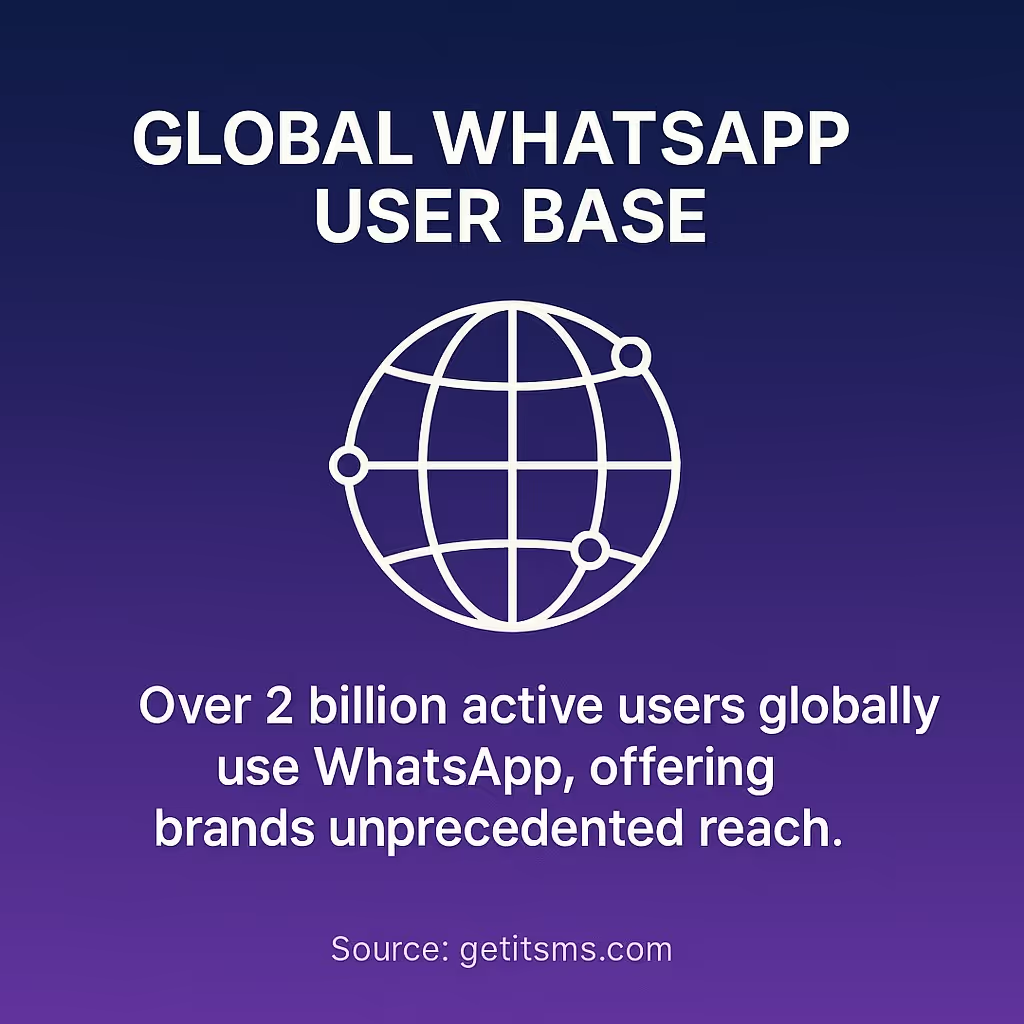
The platform enables direct, two-way conversations between brands and customers. You can share product catalogs, send order confirmations, provide customer support, and run promotional campaigns, all within a messaging interface customers already trust and use daily.
WhatsApp marketing works through two primary tools: the free WhatsApp Business app for small businesses and the WhatsApp Business API for larger organizations needing automation and integration capabilities. Both options let brands communicate with customers who have explicitly opted in to receive messages.
The results speak for themselves. WhatsApp messages achieve open rates as high as 98%, dramatically outperforming email marketing's typical 20% open rates.

In this guide, you'll understand exactly how WhatsApp marketing functions, why over 400 million businesses worldwide have adopted it, and how to implement effective campaigns that drive customer engagement and conversions.
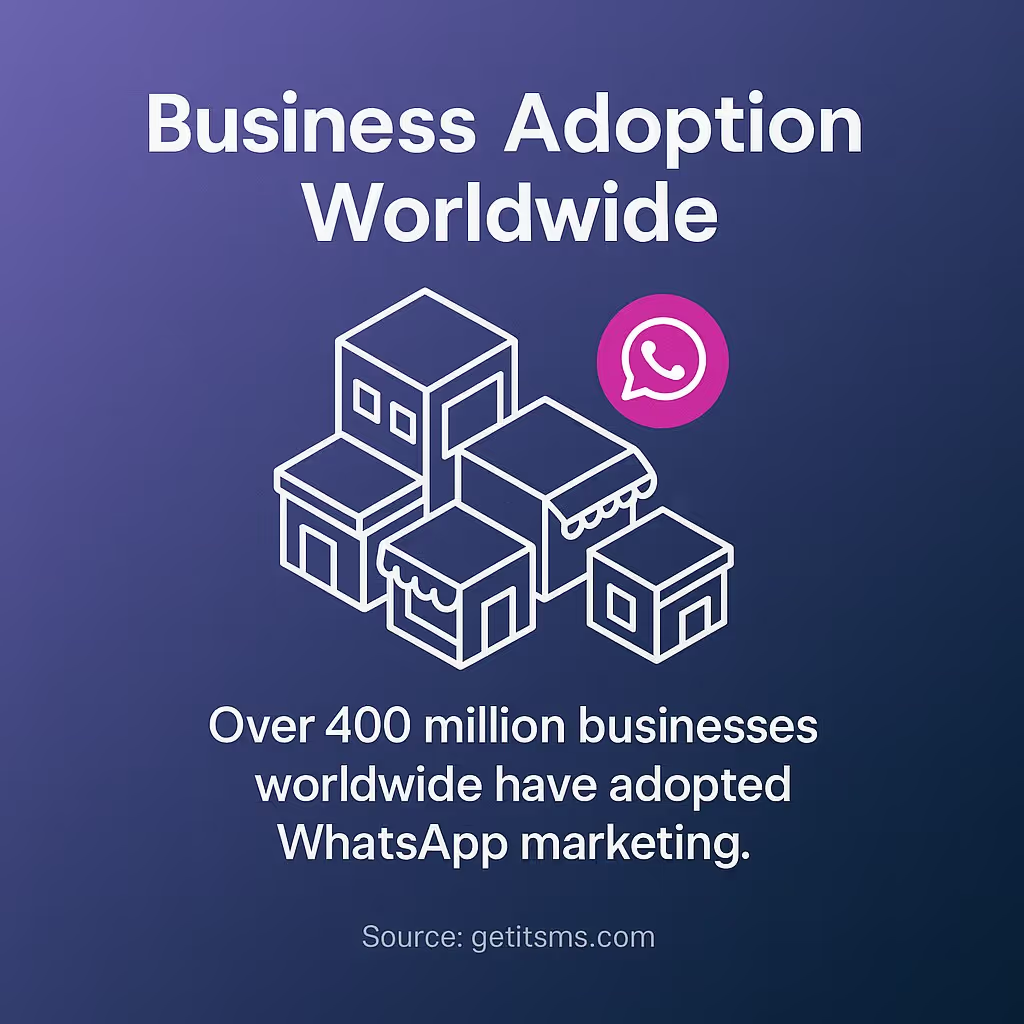
Why WhatsApp Marketing Delivers Exceptional Results
WhatsApp marketing fundamentally changes how brands interact with customers. Traditional marketing channels feel one-directional and impersonal. WhatsApp creates genuine conversations.
The platform's global reach is unmatched. With 2 billion active users across 180+ countries, your customers are already there, checking their messages multiple times daily. You're meeting them where they naturally spend time, not interrupting them in less familiar spaces.
Engagement rates tell the story clearly. WhatsApp achieves 95% open rates and 35% click-through rates compared to traditional email newsletters. Customers don't ignore WhatsApp messages the way they ignore promotional emails.

The personal nature of messaging creates stronger customer relationships. When customers receive a WhatsApp message from your brand, it appears alongside messages from friends and family. This context builds trust and familiarity that formal marketing channels struggle to achieve.
Multimedia capabilities enhance your messaging options. You can send images showing product details, videos demonstrating features, PDFs with instructions, and location pins for store visits. This variety keeps customers engaged and informed.
Real-time communication solves customer problems instantly. Questions get answered immediately. Issues get resolved quickly. This responsiveness builds customer loyalty and reduces friction in the buying process.
WhatsApp marketing can help businesses grow customer conversion ratios up to 112% by targeting customers with personalized messages based on their behavior and preferences.

The platform's end-to-end encryption reassures privacy-conscious customers. Messages remain secure, which matters increasingly to consumers making purchase decisions.
How WhatsApp Marketing Works
Understanding WhatsApp marketing starts with knowing the two main business tools available and how messages flow between brands and customers.
WhatsApp Business App vs Business API
The WhatsApp Business app serves small businesses managing conversations manually. Download it free from app stores, set up your business profile, and start messaging customers who save your number.
The app includes quick replies for common questions, greeting messages for new customers, and away messages when you're unavailable. It works perfectly for businesses handling dozens of conversations daily.
The WhatsApp Business API scales for larger operations needing automation. This paid solution integrates with your existing CRM systems, marketing automation platforms, and customer service tools.
The API enables bulk messaging to thousands of customers simultaneously, automated responses triggered by customer actions, and chatbots that handle routine inquiries 24/7. You'll need approval from WhatsApp and typically work with a Business Solution Provider for implementation.
The Opt-In Requirement
WhatsApp enforces strict consent requirements. Customers must explicitly opt in before receiving marketing messages from your brand. This protects users from spam and ensures messages reach interested audiences.
Common opt-in methods include website forms where customers check boxes agreeing to WhatsApp messages, QR codes that customers scan to start conversations, and SMS invitations asking customers to message your WhatsApp number.
You cannot purchase contact lists or add customers without permission. This requirement actually benefits brands by building engaged audiences genuinely interested in your messages.
Message Types and Templates
WhatsApp distinguishes between two message categories. Session messages are free two-way conversations within 24 hours of customer contact. Template messages are pre-approved formats for initiating contact outside the 24-hour window.
Template messages require WhatsApp approval before use. You submit your message format, WhatsApp reviews it for compliance, and once approved, you can send it to opted-in customers.
Templates work for order confirmations, shipping updates, appointment reminders, and promotional campaigns. Each template follows specific formatting rules ensuring quality customer experiences.
Interactive messages increase engagement through buttons, quick replies, and list selections. Customers tap options rather than typing responses, making interactions faster and more convenient.
Setting Up Your WhatsApp Marketing Strategy
Starting with WhatsApp marketing requires careful planning to maximize results while respecting customer preferences and platform guidelines.
Choose Your Business Tool
Small businesses with under 100 daily conversations should start with the free WhatsApp Business app. It provides essential features without technical complexity or costs.
Businesses sending messages to thousands of customers or needing CRM integration should evaluate the Business API. Contact WhatsApp Business Solution Providers to discuss your needs and implementation timeline.
Mid-sized businesses might start with the app and migrate to the API as message volumes grow. This gradual approach lets you learn WhatsApp marketing fundamentals before investing in advanced features.
Build Your Opt-In List
Create multiple touchpoints for customers to opt in. Add WhatsApp subscription checkboxes to your website checkout process, email newsletter signup forms, and account registration pages.
Display QR codes in physical locations like stores, product packaging, and printed marketing materials. Customers scan the code and automatically open a WhatsApp conversation with your business.
Promote your WhatsApp channel on social media profiles. Include your WhatsApp number in your Instagram bio, Facebook page information, and Twitter profile.
Offer incentives for joining. Provide exclusive discounts, early access to sales, or valuable content only available through WhatsApp to encourage signups.
Design Your Message Strategy
Plan message frequency carefully. Too many messages annoy customers and trigger unsubscribes. Too few messages cause customers to forget they opted in.
Most successful brands message customers one to four times monthly, depending on their business model and customer expectations. E-commerce brands might message more frequently with product updates, while B2B companies might message quarterly with industry insights.
Segment your audience based on interests, purchase history, and engagement patterns. Send relevant messages to each segment rather than generic broadcasts to everyone.
Balance promotional content with valuable information. The 80/20 rule works well: 80% helpful content like tips, tutorials, and updates; 20% promotional offers and sales messages.
Set Up Your Business Profile
Complete your WhatsApp Business profile with accurate information. Include your business name, logo, description, business hours, website link, and physical address if applicable.
Write a clear description explaining what customers can expect from your WhatsApp channel. Set expectations about response times and the types of messages you'll send.
Add catalog listings if you sell physical products. Customers can browse your products directly within WhatsApp, view details, and make purchase inquiries without leaving the app.
Essential WhatsApp Marketing Features
WhatsApp provides specific features designed to enhance customer communication and streamline business operations.
Quick Replies and Saved Responses
Quick replies store frequently used messages for instant sending. Create shortcuts for common questions about shipping, returns, business hours, and product details.
Type a forward slash followed by your shortcut keyword, and WhatsApp inserts the full saved response. This speeds up customer service while maintaining consistent, accurate information.
Build a library of 20-30 quick replies covering your most common customer inquiries. Update them regularly based on seasonal changes and new product launches.
Automated Messages
Greeting messages welcome new customers starting conversations for the first time. Use this to introduce your brand, explain how you can help, and set response time expectations.
Away messages inform customers when your business is offline. Include your business hours and when customers can expect responses. This manages expectations and reduces frustration.
For API users, automated messages can trigger based on specific customer actions like abandoned carts, product views, or completed purchases. These timely messages drive conversions by reaching customers at high-intent moments.
Interactive Buttons and Lists
Button messages present up to three clickable options for customers. Use buttons for simple choices like "Yes/No" questions, "Track Order/Contact Support" options, or "Learn More/Buy Now" calls to action.
List messages work for longer option sets. Customers tap a button to view a list of up to ten items, select their choice, and the conversation continues based on their selection.
These interactive elements reduce friction by eliminating typing. Customers tap once instead of composing responses, increasing completion rates for customer service flows and purchase processes.
WhatsApp Business API Advanced Features
The API enables chatbots that handle routine inquiries automatically. Build conversation flows for FAQs, order tracking, appointment scheduling, and product recommendations.
Integration with CRM platforms like Salesforce and HubSpot syncs WhatsApp conversations with customer records. Your team sees complete conversation history alongside email interactions, purchase data, and support tickets.
Analytics dashboards track message delivery rates, read rates, response times, and conversation volumes. These metrics help optimize message timing, content strategy, and team resource allocation.
Template message creation through the API lets you design rich media messages with images, videos, and call-to-action buttons. Submit templates for approval, then send them to customer segments based on your campaign goals.
Effective WhatsApp Marketing Campaign Types
Different campaign types serve specific business objectives. Understanding when to use each type maximizes your marketing impact.
Promotional Campaigns
Flash sales and limited-time offers work exceptionally well on WhatsApp. The immediate nature of messaging creates urgency that drives quick conversions.
Announce new products to your WhatsApp audience first. Give them early access or exclusive discounts that reward their subscription. This builds loyalty and makes customers feel valued.
Holiday campaigns reach customers during peak shopping seasons. Send gift guides, seasonal product collections, and special holiday discounts timed to when customers are actively shopping.
Personalized offers based on purchase history perform better than generic promotions. If a customer bought running shoes, send them promotions for running apparel rather than unrelated products.
Transactional Messages
Order confirmations sent immediately after purchase reassure customers and set delivery expectations. Include order numbers, expected delivery dates, and tracking links.
Shipping notifications with real-time tracking updates keep customers informed throughout the delivery process. Send messages when orders ship, when they're out for delivery, and when they're delivered.
Appointment reminders reduce no-shows for service businesses. Send reminders 24 hours before appointments with options to confirm, reschedule, or cancel directly through WhatsApp.
Payment confirmations and invoice receipts provide transaction documentation customers can easily reference later.
Customer Service and Support
Product support through WhatsApp gives customers convenient help channels. They can send photos of issues, receive troubleshooting instructions, and get problems resolved without phone calls or emails.
Returns and exchanges process faster when handled through WhatsApp. Customers initiate returns, receive instructions, and track return status all within the messaging interface.
FAQ automation through chatbots answers common questions instantly. Customers get immediate help for simple inquiries, while complex issues escalate to human agents.
Content Marketing and Engagement
Educational content builds authority and keeps your brand top of mind. Send tips, tutorials, how-to guides, and industry insights that provide value beyond selling products.
Product recommendations based on browsing history or past purchases help customers discover relevant items. These personalized suggestions increase average order values.
Behind-the-scenes content humanizes your brand. Share team stories, product development updates, and company news that builds emotional connections with customers.
Interactive polls and surveys gather customer feedback while engaging your audience. Ask about product preferences, content interests, or shopping experiences.
WhatsApp Marketing Best Practices
Following proven best practices ensures your WhatsApp marketing delivers results while maintaining positive customer relationships.
Respect Customer Privacy and Preferences
Always honor opt-out requests immediately. Make unsubscribing easy by including clear instructions in your messages. Customers who want to leave should be able to do so with a simple reply like "STOP."
Never share customer phone numbers with third parties. WhatsApp marketing relies on trust, and data misuse destroys that foundation quickly.
Be transparent about message frequency during opt-in. Tell customers how often they'll hear from you and what types of messages they'll receive.
Personalize Your Communications
Use customer names in greetings and throughout messages. This small touch makes messages feel personal rather than automated broadcasts.
Reference past purchases or interactions when relevant. "Since you enjoyed [previous product], you might like [related product]" shows you understand customer preferences.
Segment audiences based on behavior, demographics, and interests. Send targeted messages to specific groups rather than identical messages to everyone.
Optimize Message Timing
Send messages during business hours in your customers' time zones. Avoid early mornings, late evenings, and holidays unless sending time-sensitive information.
Test different send times to identify when your audience engages most. Some businesses see better results with morning messages, while others find afternoon or evening sends perform better.
Consider customer routines and your business type. Coffee shops might message in the morning, restaurants near lunch or dinner, and entertainment venues in the evening.
Keep Messages Concise and Valuable
Get to the point quickly. Mobile users scan messages rapidly, so front-load important information.
Use clear calls to action. Tell customers exactly what you want them to do next: shop now, book appointment, learn more, or reply with their preferences.
Break long information into multiple messages or use multimedia. A short video often communicates more effectively than a lengthy text message.
Test and Optimize Continuously
A/B test message variations to identify what resonates with your audience. Test different offers, message lengths, calls to action, and sending times.
Monitor key metrics like open rates, click-through rates, conversion rates, and unsubscribe rates. These indicators show what's working and what needs adjustment.
Gather customer feedback regularly. Ask customers what types of messages they find valuable and what they'd like to see more or less of.
Industries Benefiting from WhatsApp Marketing
WhatsApp marketing works across industries, but certain sectors see particularly strong results due to their customer communication needs.
E-commerce and Retail
Online retailers use WhatsApp for abandoned cart recovery, sending personalized reminders with product images and direct checkout links. This recovers sales that would otherwise be lost.
Product launches reach engaged audiences instantly. Retailers notify customers when popular items restock or new collections arrive, driving immediate traffic and sales.
Personal shopping services through WhatsApp create VIP experiences. Customers message with questions, receive personalized recommendations, and complete purchases through conversation.
Travel and Hospitality
Hotels send booking confirmations, check-in reminders, and stay information through WhatsApp. Guests can request room service, ask questions, and extend stays without calling the front desk.
Travel agencies share itineraries, booking updates, and travel tips. Last-minute changes reach travelers instantly, reducing stress and improving trip experiences.
Airlines send flight updates, gate changes, and boarding passes directly to passengers' WhatsApp. This reduces missed flights and improves customer satisfaction.
Financial Services
Banks use WhatsApp for account alerts, transaction confirmations, and fraud notifications. Customers receive time-sensitive information immediately, increasing security and trust.
Insurance companies handle claims through WhatsApp. Customers submit documentation via photos, receive status updates, and ask questions without navigating complex phone systems.
Financial advisors schedule appointments, send market updates, and answer client questions through secure WhatsApp conversations.
Healthcare and Wellness
Medical practices send appointment reminders, test results, and prescription refill notifications. This improves patient compliance and reduces missed appointments.
Fitness centers share workout tips, class schedules, and membership information. Members can book classes, ask trainers questions, and stay motivated between visits.
Wellness brands provide health tips, track customer progress, and offer personalized coaching through ongoing WhatsApp conversations.
Food and Beverage
Restaurants take reservations, share daily specials, and send order confirmations through WhatsApp. Customers can modify orders or ask about ingredients without phone calls.
Food delivery services update customers on order status from kitchen to doorstep. Real-time tracking reduces "where's my order?" anxiety.
Catering companies coordinate event details, menu selections, and delivery logistics through WhatsApp's multimedia messaging capabilities.
Comparing WhatsApp to Other Marketing Channels
Understanding how WhatsApp compares to email, SMS, and social media helps you allocate marketing resources effectively.
FeatureWhatsApp MarketingEmail MarketingSMS MarketingOpen Rate95-98%15-25%90-98%Click-Through Rate35-45%2-5%15-20%CostLow to moderateVery lowModerate to highMultimedia SupportImages, videos, documents, audioImages, videos, GIFsLimited to imagesTwo-Way ConversationEasy and naturalPossible but clunkyLimited by character countCharacter Limit65,536 charactersNo practical limit160 charactersGlobal Reach2 billion users4 billion users5 billion usersBest Use CasesCustomer service, personalized offers, order updatesNewsletters, detailed content, nurture campaignsTime-sensitive alerts, appointment reminders
When to Choose WhatsApp Over Email
WhatsApp works better for time-sensitive communications requiring immediate attention. Order updates, shipping notifications, and urgent announcements reach customers faster through WhatsApp.
Customer service conversations flow more naturally on WhatsApp. The back-and-forth messaging format feels more personal than email exchanges.
Young audiences prefer WhatsApp. If your target demographic is under 40, they likely check WhatsApp more frequently than email.
Email remains superior for long-form content like newsletters, detailed product information, and content marketing. Email also offers more sophisticated design options and better analytics for large campaigns.
When to Choose WhatsApp Over SMS
WhatsApp provides richer media options than SMS. If your message benefits from images, videos, or documents, WhatsApp delivers better customer experiences.
International messaging costs less on WhatsApp. SMS charges increase significantly for international numbers, while WhatsApp messages cost the same regardless of location.
WhatsApp supports longer messages without breaking content into multiple texts. Complex information communicates more clearly in single WhatsApp messages.
SMS works better for reaching customers without smartphones or internet access. SMS also avoids app-specific barriers when customers might not use WhatsApp regularly.
Integrating WhatsApp with Other Channels
The most effective marketing strategies use multiple channels together. Send email newsletters with WhatsApp signup links. Include your WhatsApp number in social media bios.
Cross-promote exclusive content on different channels. Announce on Instagram that WhatsApp subscribers get early access to sales. Tell email subscribers about exclusive tutorials only available through WhatsApp.
Use channel strengths strategically. Email for monthly newsletters, WhatsApp for order updates, social media for brand awareness, and SMS for critical alerts.
Tools like multi-channel CRM platforms help coordinate messaging across channels, ensuring consistent customer experiences without duplicate or conflicting communications.
Measuring WhatsApp Marketing Success
Tracking the right metrics helps you understand what's working and where to improve your WhatsApp marketing efforts.
Key Performance Indicators
Delivery rate measures the percentage of sent messages successfully delivered to recipients. Low delivery rates indicate phone number issues or customers who blocked your business.
Read rate shows how many delivered messages customers actually opened. This metric indicates message relevance and optimal sending times.
Response rate tracks two-way engagement. Higher response rates suggest customers find your messages valuable and want to continue conversations.
Click-through rate measures how many customers tap links or buttons in your messages. This directly indicates message effectiveness in driving desired actions.
Conversion rate is the ultimate success metric. Track how many WhatsApp message recipients complete purchases, book appointments, or achieve other campaign goals.
Unsubscribe rate signals customer satisfaction with your messaging frequency and content quality. Rising unsubscribe rates require immediate strategy adjustment.
Attribution and ROI Calculation
Use unique links and coupon codes in WhatsApp messages to track conversions directly. Tools like Google Analytics can track WhatsApp traffic when you add UTM parameters to your links.
Calculate ROI by dividing WhatsApp-attributed revenue by your total WhatsApp marketing costs. Include platform fees, staff time, and content creation costs in your calculation.
Compare WhatsApp ROI to other marketing channels. This shows where WhatsApp fits in your marketing mix and whether to increase or decrease investment.
Customer Feedback Metrics
Customer satisfaction scores gathered through post-conversation surveys indicate experience quality. Send brief one-question surveys after customer service interactions.
Net Promoter Score (NPS) measures customer loyalty. Ask customers how likely they are to recommend your WhatsApp channel to others.
Direct feedback through replies provides qualitative insights that numbers miss. Pay attention to what customers say about your messages, frequency, and content.
Common WhatsApp Marketing Mistakes to Avoid
Learning from common pitfalls saves time and protects your customer relationships as you develop your WhatsApp marketing strategy.
Sending Without Proper Opt-In
Adding customers to your WhatsApp audience without explicit consent violates WhatsApp policies and damages customer trust. Always require clear opt-in before sending marketing messages.
Assuming existing email subscribers automatically consent to WhatsApp messages is incorrect. Treat WhatsApp as a separate channel requiring separate permission.
Over-Messaging Your Audience
Excessive message frequency is the fastest way to trigger unsubscribes. More messages don't automatically equal better results.
Start conservatively with one message per week or bi-weekly. Increase frequency gradually based on engagement metrics and unsubscribe rates.
Sending Generic, Impersonal Messages
Treating WhatsApp like a mass email blast wastes the platform's personalization potential. Customers expect personal, relevant communication through messaging apps.
Use customer data to personalize messages beyond just names. Reference purchase history, browsing behavior, and stated preferences.
Ignoring Customer Responses
WhatsApp is a two-way communication channel. Sending messages without monitoring or responding to replies frustrates customers and defeats the platform's purpose.
Establish clear response time goals. If you can't respond within a few hours, set up automated away messages explaining when customers can expect replies.
Neglecting Message Quality
Poorly written messages with typos, unclear calls to action, or broken links damage your brand credibility. Review every message carefully before sending.
Test all links, images, and interactive elements before launching campaigns. What looks perfect in your testing environment might break for customers on different devices.
Failing to Segment Your Audience
Sending identical messages to your entire audience ignores individual customer needs and preferences. Segmentation dramatically improves relevance and engagement.
Create segments based on purchase history, geographic location, engagement level, and customer lifecycle stage. Tailor messages to each segment's specific interests.
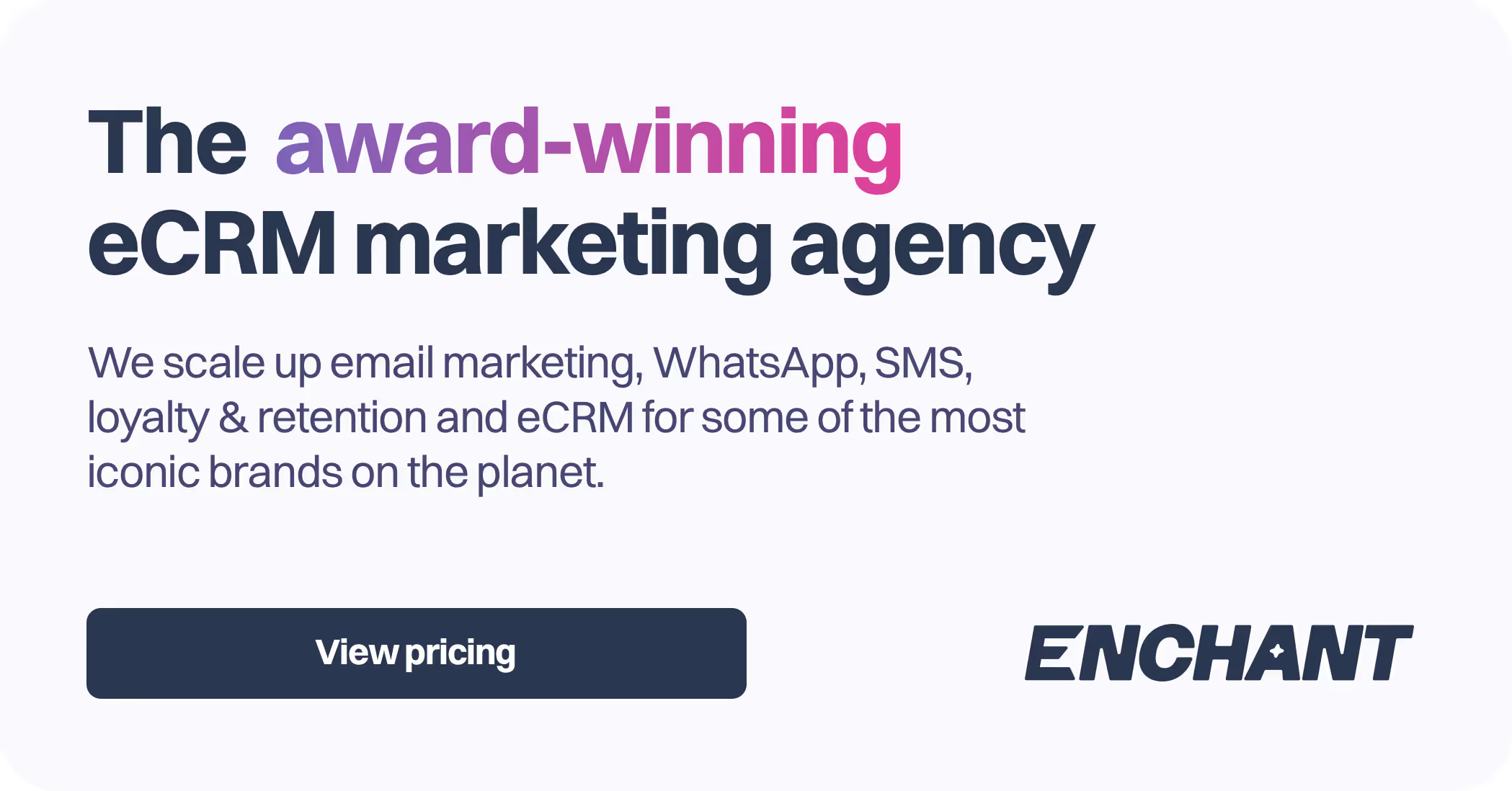
Future Trends in WhatsApp Marketing
WhatsApp marketing continues developing, with 2025 trends focusing on automation, personalization, and engagement. Staying ahead of these trends positions your business for continued success.
Enhanced AI and Automation
Artificial intelligence improvements make chatbots more sophisticated and helpful. Natural language processing helps bots understand customer intent better, providing more relevant responses.
Predictive automation will send messages at optimal times for individual customers based on their past behavior patterns. Your messages arrive when customers are most likely to engage.
AI-powered product recommendations will analyze customer conversations and browsing data to suggest highly relevant products through WhatsApp messages.
Richer Interactive Experiences
WhatsApp continues adding interactive features that enhance customer experiences. Expect expanded carousel formats, interactive product catalogs, and enhanced payment integration.
Augmented reality features may let customers visualize products in their space directly through WhatsApp. Furniture retailers could show how couches look in customer living rooms.
Video messages and live video calls may integrate more deeply into marketing workflows, enabling virtual shopping assistance and product demonstrations.
Deeper Business Integration
WhatsApp integrations with e-commerce platforms, CRM systems, and marketing automation tools will become more seamless. Businesses will manage WhatsApp as easily as email within existing marketing stacks.
Social commerce integration will let customers complete entire purchases without leaving WhatsApp. Browse products, add to cart, pay, and track delivery all within the conversation.
Analytics capabilities will expand, providing deeper insights into customer behavior, conversation patterns, and campaign performance across the entire customer journey.
Quick Answers to Common Questions
Is WhatsApp marketing free or paid?
WhatsApp marketing can be both free and paid. Small businesses use the free WhatsApp Business app for basic marketing. Larger campaigns and automation require the paid WhatsApp Business API, which charges per message or conversation.
Is WhatsApp marketing safe?
WhatsApp marketing is generally safe when businesses follow best practices, obtain user consent, and use official WhatsApp Business tools offering end-to-end encryption and compliance with privacy regulations. Misuse or spam can lead to account bans.
Is WhatsApp marketing legal?
WhatsApp marketing is legal when businesses comply with data protection laws like GDPR and obtain explicit consent before sending marketing messages. Using official WhatsApp Business tools and respecting opt-out requests ensures legal compliance.
Taking Your First Steps with WhatsApp Marketing
WhatsApp marketing offers direct, personal connections with customers that traditional marketing channels struggle to match. The platform's exceptional open rates, engagement metrics, and global reach make it essential for modern marketing strategies.
Start by choosing the right business tool for your needs. Small operations benefit from the free WhatsApp Business app. Growing businesses should evaluate the API for automation and scale.
Build your audience through multiple opt-in channels. Make subscribing easy and valuable by offering exclusive content or discounts available only through WhatsApp.
Focus on providing value in every message. Balance promotional content with helpful information, customer service, and relevant updates that improve customer experiences.
Test, measure, and optimize continuously. Track your key metrics, listen to customer feedback, and adjust your strategy based on what the data tells you.
For businesses ready to implement professional WhatsApp marketing strategies, WhatsApp marketing management services provide expert guidance and execution.
The brands succeeding with WhatsApp marketing treat it as a relationship-building channel, not just another promotional broadcast tool. Your customers are already on WhatsApp. The question isn't whether to use WhatsApp marketing, but how quickly you can implement it effectively.




.svg)
.avif)




